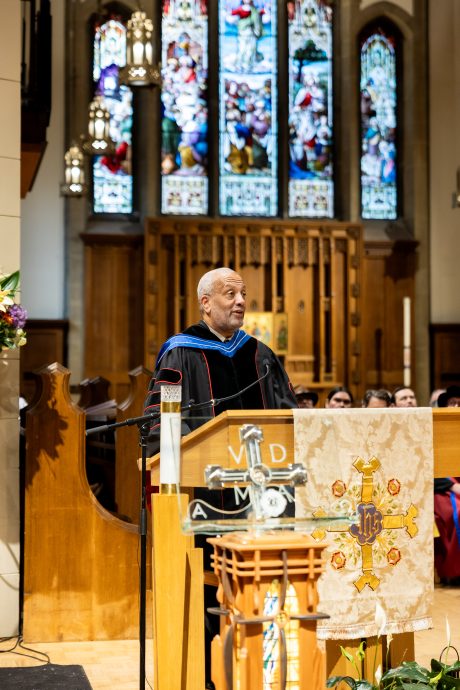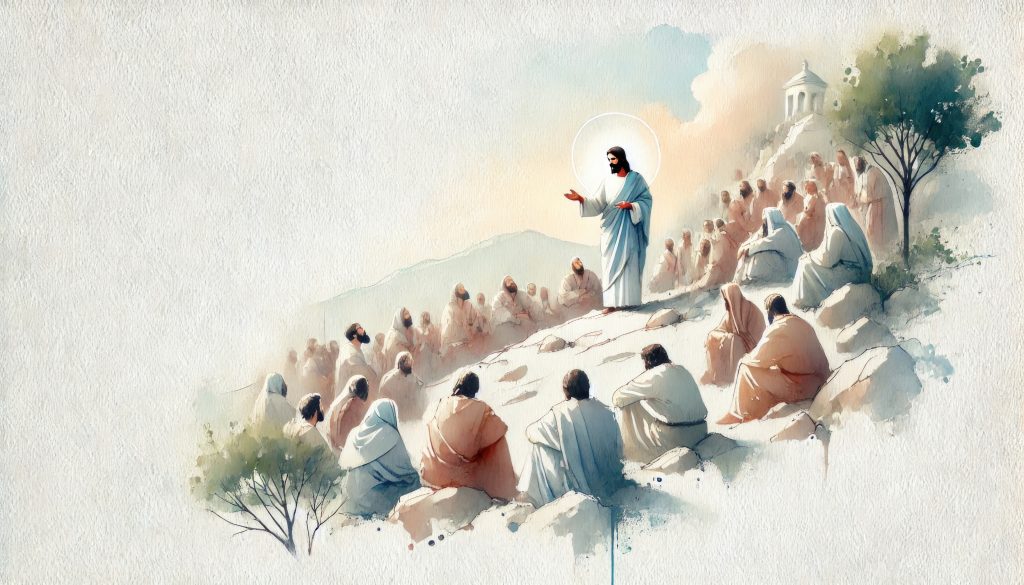The Power of Small Things: Practising the Beatitudes in a Broken World
Good evening, graduates, faculty, families, and friends. It is an honour to stand before you in this sacred space, Christ Church Cathedral, on this significant occasion in your lives. Today marks both an ending and a beginning—a moment of deep transition, a threshold moment that calls you to reflect on the paths you have walked and the journeys yet to come. As you prepare to step out into a world marked by complexity, fragmentation, and deep uncertainty, I want to offer you a vision of success. I imagine all of you hope to be successful in your future lives. You certainly have been thus far! Reaching the stage of graduation is a testament to your hard work and determination. You should be very pleased with yourselves. You have been very successful in your education. Congratulations!

Rev. Dr. John Swinton giving the 2025 Convocation Address | Photo by Christopher Sanford Beck
Important as that kind of success is, the type of success I want us to think about tonight is in some ways different from the achievements we are rightly celebrating this evening. The vision of success I want to offer you does not conform to the metrics of power, achievement, or control that so often dominate our cultural imagination. Instead, I would like to extend an invitation to you. An invitation into a strange new world: the world brought to us through the Beatitudes. The Beatitudes offer a vision of a strange new world and summon us to enter into it. In this strange new world, success comes when we relinquish worldly power and assumptions about what constitutes success. Success arrives when we act justly, become peacemakers, form loving communities filled with those whom society considers failures, comfort the grieving, and bring hope to the broken-hearted. In this new world, our success is not gauged by money, power, or personal achievement, but by faithfulness to the way of Jesus. Consider the opening words of Jesus’ sermon:
Blessed are the poor in spirit, for theirs is the kingdom of heaven.
Blessed are those who mourn, for they will be comforted.
Blessed are the meek, for they will inherit the earth.
Blessed are the merciful, for they will receive mercy.
Blessed are the pure in heart, for they will see God.
Blessed are the peacemakers, for they will be called children of God.
Blessed are those who are persecuted for righteousness’ sake, for theirs is the kingdom of heaven.” (Matthew 5:3-10)
Those startling blessings that Jesus pronounced on a hillside in another country thousands of years ago upend our assumptions about power, purpose and achievement. They draw our attention to the small, the humble, the overlooked, and the marginalised. They remind us that the Kingdom of God is not a place where the powerful dominate, but where the broken are blessed, the meek inherit, the peacemakers are honoured. Each Beatitude presents a form of holy subversion:
Blessed are the poor in spirit – In a world that celebrates self-sufficiency, this blessing elevates the vulnerable, those who have come to the end of their own resources and learned to trust in the abundance of God.
Blessed are those who mourn – In a culture that denies death and distracts itself from suffering, this blessing acknowledges the dignity of grief and the sacredness of loss.
Blessed are the meek – In a society that rewards aggression and self-promotion, this blessing honours those who quietly endure, who choose the path of humility over domination.
Blessed are the merciful – In a context that often seeks retribution and hard justice, this blessing calls us to radical forgiveness and the restoration of broken relationships.
Blessed are the peacemakers – In a world fractured by conflict and division, this blessing recognises those who risk misunderstanding and rejection to stand in the breach as agents of reconciliation.
These are not the principles of corporate success or political power. They are the marks of a life lived deeply in the presence of God, attentive to the quiet, transformative work of the Spirit in the hidden places of human existence.
Being weird for Jesus
Last year I attended the Alpha leadership conference in the Royal Albert Hall in London. 5,000 people gathered to discuss Jesus. It was very interesting. One of the highlights for me was the historian Tom Hollins. In his book Dominion: The Making of the Western Mind he argues that the moral and cultural foundations of the modern West, especially values such as human dignity, equality, and the prioritisation of the weak, are profoundly shaped by Christianity. Holland contends that even secular liberalism, human rights discourse, and modern notions of justice are unintelligible without the revolutionary moral vision introduced by Christianity. Holland is not a Christian, but he has an interesting take on Christianity. At one point he said: “Christians need to regain their weirdness! Anyone who thinks that in Mediterranean culture 2000 years ago it was normal for someone to claim to be God, to be crucified and to rise again is seriously mistaken. It was weird then, and it is weird now! It didn’t become weird because of the rise of science. It was always weird. The one thing that Christians have to offer to the world is their weirdness!” So! My advice to all of you graduates, and indeed to all of you, is to embrace your weirdness. Be weirdos for Jesus! The weirder the better. Because it is in the weirdness of God’s Kingdom that we discover freedom, truth, love, justice and the power of small things.
Practising the Beatitudes in a Broken World
Because it is in the weirdness of God’s Kingdom that we discover freedom, truth, love, justice and the power of small things.
The Beatitudes are pretty weird, yet, if we listen to them, our world is not just turned upside down; it is completely rebuilt. So, what might it look like to practise the Beatitudes in a broken world? It begins with a willingness to embrace smallness, to pay attention to the unnoticed, to be present to the beauty in the ordinary. It requires the courage to confront suffering, to resist the lure of power, and to stand with those on the margins. It means taking time for those things and those people that the world considers trivial, unimportant, and worthless. If we act in such weird ways, we might be surprised at what we find in the small things. Let me share a story.
L’Arche story: Edmund’s story
A few years ago, I did a study exploring the spiritual lives of people with profound and complex intellectual disabilities, that is, people who do not have words, symbols of the level of intellect demanded by religion. For those of us coming from the Reformed tradition, words are very important. We need words to pray, to confess, to talk with Jesus. But what happens when you don’t have words or the ability to speak with anyone? As part of that project, I spent some time in a L’Arche community in France. The L’Arche communities are places where people with intellectual disabilities and those without come together in the spirit of the beatitudes and the friendships of Jesus, not as carer and cared for but as friends. I met a German man, Edmund, who had come to the community ten years previously. He was not a Christian when he went into the community. One of his duties was to take a man with profound intellectual disabilities, David, to the chapel each day. Edmund dutifully took David to the chapel each day. He hated it! He didn’t see the point. People just sat around signing and eating bread, and drinking wine. “What was the point?” he thought.
And then unexpectedly, David died. Edmund was deeply moved, not just by David’s death, but also by the fact that he missed the sacrament. Each day, he had gone backwards and forwards to the chapel, thinking he was doing David a favour. In fact, each and every day, God had been working through David to bring Edmund to a place of faith. This is how Edmund put it: “The sacrament does its own travelling.” What seemed like “just a job” for Edmund turned out to be a place of revelation where he learned to find God in the small things. What looked like an ordinary, mundane daily task turned out to be a meeting place with God. And who led him there? Someone whom the world considered to be trivial, unimportant, and pointless. A man with no words but a genuine heart for Jesus. Edmund found God in a job that wasn’t glorious; he wasn’t paid much, and there was no career path. But what there was was a group of Beatitude people who reminded him, indeed led him to discover God and hidden beauty in the mundane day-to-dayness of his apparently trivial job.
Now I don’t know what you will end up doing, but whatever it is, make sure you are always aware that God might surprise you. Keep an eye open for the small things, and you never know, you might just find God there. But more than that, whatever you end up doing, do it in the spirit of the Beatitudes. If you become a teacher, make sure the weak are held high. If you become a spiritual caregiver, ensure that the system works towards justice for the poor.
If you become a pastor, ensure that the poor in spirit can find a place in your church. Help the mourners to be comforted, and above all else, ensure that mercy finds a home at the heart of your ministry. And if you become a theologian, make sure to teach your students about the real God, who loves the poor, welcomes the stranger, is overflowing with mercy, and cares little about one’s wealth. Any other God is not God.
Living in the world of the Beatitudes won’t be easy. Indeed, you may find yourself the one who is blessed as you are persecuted for standing up for righteousness. But it will be worth it, and the promise is that Jesus will be with you every step of the way. Your job is to love, as Thomas Merton once put it. Your task is to reveal the Kingdom wherever you go. Your vocation as a Christian is to change the world, not in your own strength but in the strength of the one who says to you: “go out into the world, change it with my love, and then, when the time is right, come home. I will be waiting.”
A Commission to the Graduates
And so, as you prepare to leave this place, I want to commission you not simply to be successful in the conventional sense, but to be faithful, to be present, to pay attention to the small things and above all, to be weird. The Beatitudes present a radically different vision of what it means to live well, lead faithfully, and love deeply in a broken world. It will demand of you a different kind of attention, a different measure of success, and a deeper form of courage.
Your task is to reveal the Kingdom wherever you go. Your vocation as a Christian is to change the world…
So, as you leave this place, my prayer is that you will find the courage to live into the Beatitudes. May you have the grace to embrace smallness in a broken world, and in doing so, bear witness to the quiet, subversive power of the God who blesses the overlooked and lifts up the lowly.
May the peace of Christ be with you all. Amen.

Rev. Dr. John Swinton was the 2025 VST Convocation Speaker. Known for his work as a practical theologian bringing together key concerns for mental health and disability, Prof. Swinton is Professor of Pastoral Theology and Head of the Department of Divinity and Religion at Aberdeen University, Scotland.
